Top takeaways from student loan forgiveness arguments at the Supreme Court
The debate over President Biden’s student loan relief for millions of Americans came to a head on Tuesday as Supreme Court justices grilled the administration and its challengers during oral arguments.
As thousands outside the court were advocating for Biden’s plan for up to $20,000 in forgiveness, the conservative-leaning court spent more than three hours listening to two different challenges to the program.
The main focus in both cases was the standing of the challengers, meaning their legal right to sue, and the scope of the Higher Education Relief Opportunities for Students (HEROES) Act.
The questioning from the justices highlighted the split between the liberal and conservative sides of the court, casting doubt that the plan, a major campaign promise for Biden, will be able to succeed.
Here are the top takeaways from Tuesday’s arguments:
Barrett joins liberals in questioning states’ legal standing
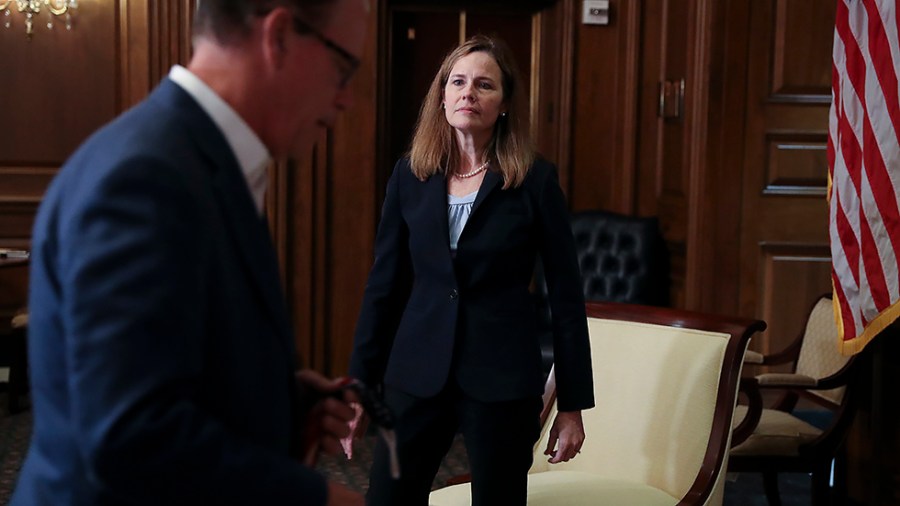
Barrett joined the liberal justices in arguing the legal standing of the Republican states challenging the student loan forgiveness program. (Bloomberg/Pool)
One of the more surprising moments from the arguments came from Justice Amy Coney Barrett, appointed by former President Trump, questioning, alongside the liberal justices, the legal standing of the six Republican-led states challenging the relief.
A good portion of the first case, Biden v. Nebraska, focused on if states have the right to sue over the potential financial harm the program could cause to the Higher Education Loan Authority of the State of Missouri (MOHELA), a loan servicer.
Nebraska Solicitor General James Campbell argued Missouri’s revenues would be negatively impacted due to the financial harm caused to MOHELA from the program, but questions also arose regarding if the state was incorporated enough with MOHELA that it could sue on the company’s behalf.
The three liberal justices on the court, along with Barrett, grilled Campbell on the fact that Missouri law makes it so MOHELA’s financial debts are not entangled with the state, and the extent to which MOHELA is a separate corporation.
“If MOHELA is an arm of the state, why didn’t you just strong-arm MOHELA and say you’ve got to pursue this suit?” Barrett asked.
Justices invoke major questions doctrine
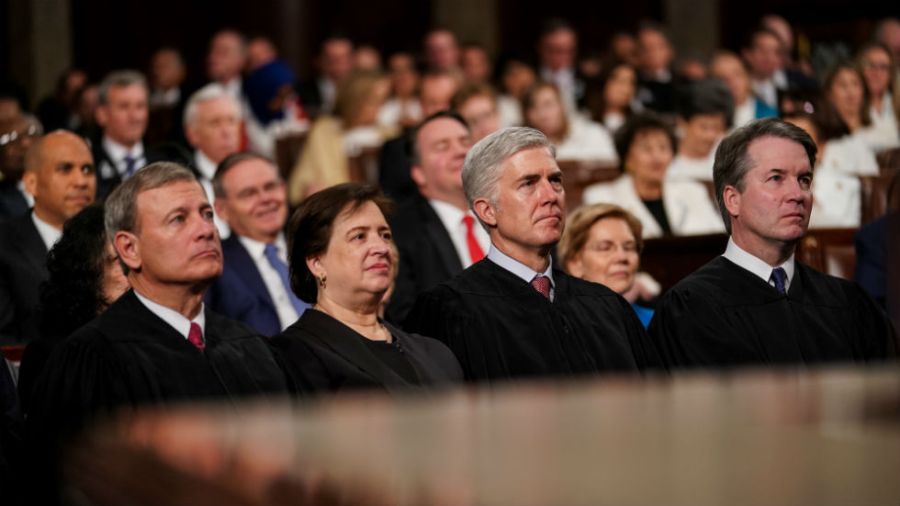
The conservative justices centered a number of their arguments around the major questions doctrine. (Getty)
The conservative justices focused much of their attention on the major questions doctrine, which says an agency can only decide on matters of vast economic and political significance when Congress gives it clear authority to do so.
“If you’re talking about this in the abstract, I think most casual observers would say, if you’re going to give up that much amount of money, if you’re going to affect the obligations of that many Americans on a subject that’s of great controversy, they would think that’s something for Congress to act on,” Chief Justice John Roberts said.
U.S. Solicitor General Elizabeth Prelogar, arguing on behalf of the administration, told the court the government is “not disputing that this is a politically significant action,” but that the language of the HEROES Act is clear enough to give the Education Department secretary the power to forgive student loans.
The law says that the Education secretary is able to “waive or modify” federal student financial assistance programs “as the Secretary deems necessary in connection with a war or other military operation or national emergency” such as the COVID-19 pandemic.
“Congress doesn’t get much clearer than that. We deal with congressional statutes every day that are really confusing. This one is not,” liberal Justice Elena Kagan said.
Conservative justices stress price tag of debt relief
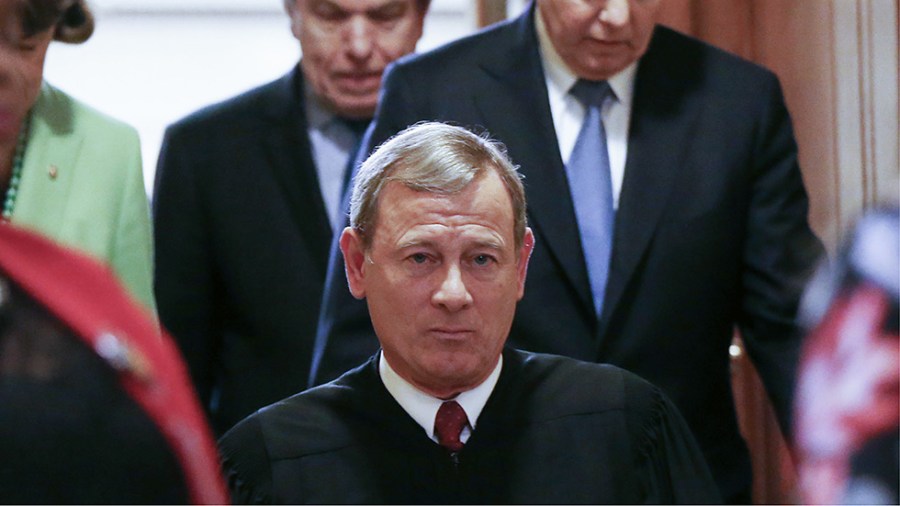
A number of the conservative justices, including Chief Justice John Roberts, emphasized the program’s price tag in their arguments. (Getty)
The cost of student loan relief was made loud and clear inside the courtroom as the conservative justices balked at the estimated $400 billion the Congressional Budget Office says the program could cost.
“We’re talking about half a trillion dollars and 43 million Americans. How does that fit under the normal understanding of ‘modifying’?” Roberts asked as the court discussed the meaning of “modify” and “waive” in the HEROES Act.
The cost of the plan has been the subject of Republican scorn for months, with arguments emerging about how it is unfair to use so much taxpayer money, especially from individuals who never went to college or worked to ensure they had no debt after they left school.
“There’s some discussion in the briefs that going past with this provision or that modification or waiver, that this is, in effect, a cancellation of a debt — that’s really what we’re talking about — and that as a cancellation of $400 billion in debt, in effect, this is a grant of $400 billion, and it runs head long into Congress’s appropriations authority,” Justice Clarence Thomas remarked.
The liberal justices pushed back against conservatives’ focus on the cost of the program, pointing out the student loan payment pause during the pandemic also has cost a significant amount, but no one is contesting the Education secretary’s authority to continue it.
“The forbearance of pay is $5 billion a month or something like that?” Justice Sonia Sotomayor said. “It’s an outrageous sum, and yet no one is disputing that. The secretary has that power. It’s not the amount of money; the question is what’s Congress’s intent?”
Biden administration insists Congress foresaw debt relief in passing HEROES Act
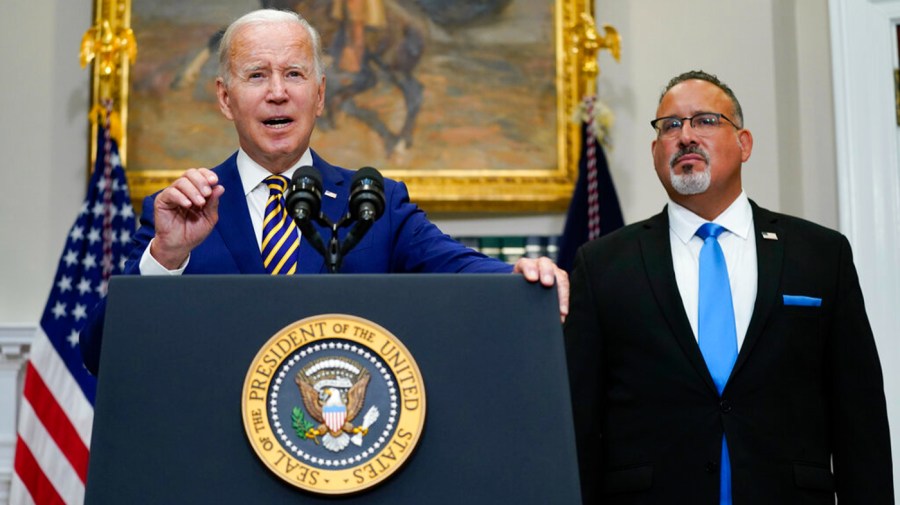
U.S. Solicitor General Elizabeth Prelogar, who argued on behalf of the Biden administration, insisted that Congress was aware of the possibility of a student debt relief initiative. (Associated Press/Evan Vucci)
Prelogar spent much of the time insisting to the justices that Congress knew there was a possibility that HEROES Act could be used to forgive student debt relief.
“And if the Court overrides that clear HEROES Act language here, I think that it could only thwart Congress’s intent in this particular posture of ensuring that you have the tools, the Secretary has the tools he needs to take care of Americans in a — a national emergency situation,” she told Roberts.
The conservative justices seemed wary that Biden’s plan could encroach on the separation of powers the Supreme Court is supposed to uphold.
“The fact that it hasn’t acted under the major questions doctrine but has considered the matter we cited as support for the notion that maybe it should be one for Congress,” Roberts said.
Prelogar argued Congress could have amended the HEROES Act if it wanted, and that lawmakers even showed some support for the action.
In the American Rescue Plan passed during the pandemic, Prelogar argued, the law “specifically anticipated and sought to facilitate a program of loan discharge by providing that it wouldn’t be subject to federal taxation from 2021 to 2025.”
What comes next?
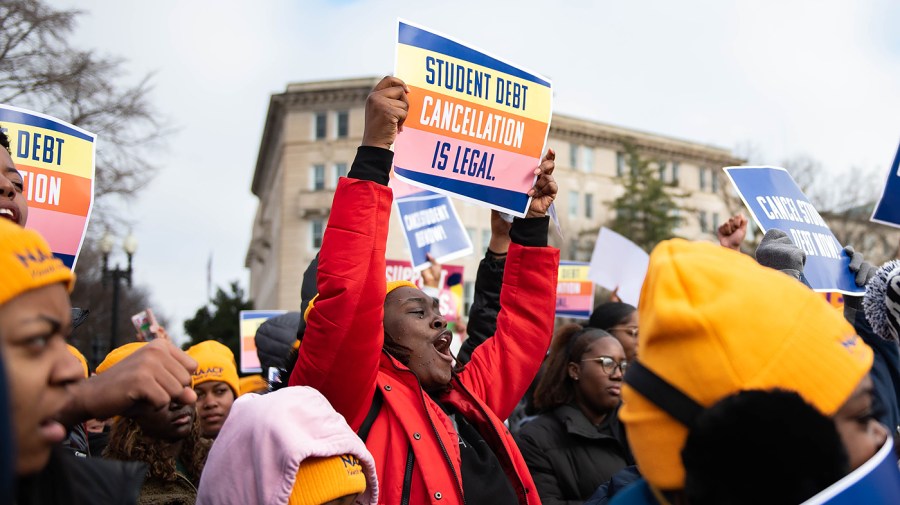
People in favor of President Biden’s student loan forgiveness plan rally in front of the Supreme Court in Washington, D.C., on Washington, D.C., as the court hears the Department of Education v. Brown and Biden v. Nebraska. (Annabelle Gordon)
The oral arguments have concluded and the fate of student debt relief now rests in the hands of the nine justices.
The justices will conference among themselves, going back and forth for months working on a draft opinion.
Although the justices have the ability to release their decisions anytime, it is likely a final ruling won’t be made public until May or June. Once a ruling is made, borrowers will know the fate of their student loan relief and the timer will begin for the payment pause to end.
As long as the ruling is announced before June 30, the pandemic repayment pause will end 60 days after the Supreme Court announces its decision to greenlight or kill Biden’s plan.
Copyright 2023 Nexstar Media Inc. All rights reserved. This material may not be published, broadcast, rewritten, or redistributed. Regular the hill posts







